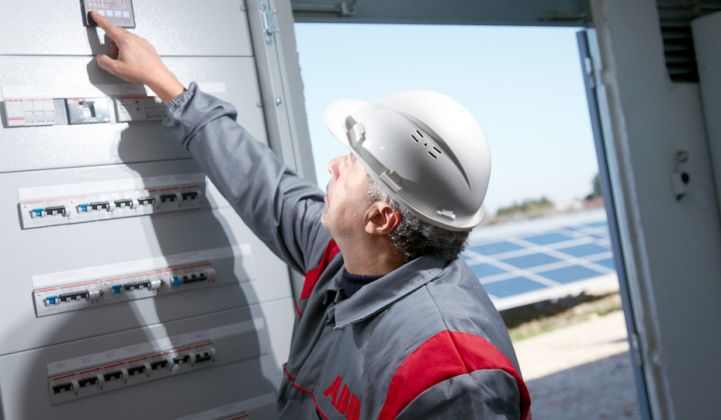ABB is buying General Electric’s industrial solutions business for $2.6 billion, with an eye on competing with top player Schneider Electric in the U.S. market share for circuit breakers, switchgear and other low-voltage electrical equipment, as well as specialized lighting control and power supply equipment for data centers, hospitals and other critical facilities.
It’s a big move in a multibillion-dollar business -- GE’s unit generated revenues of $2.7 billion in the 2016 fiscal year, and ABB’s electrical products division delivers more than 1.5 million products to customers on a daily basis. ABB CEO Ulrich Spiesshofer told Bloomberg that the U.S. market for electrification is worth about $30 billion a year, and ABB will retain GE’s brand and management team.
The deal, set to close in the second half of 2018 pending regulatory approval, is expected to incur integration costs of about $400 million over the next five years, but it will provide the potential for annual cost benefits of $200 million by the fifth year of the deal.
The GE unit’s profit margins, around 8 percent in 2016, are lower than ABB’s comparable margins, due to underinvestment in the business over the past several years, Spiesshofer told reporters in a Monday conference call. But the company expects to bring its margins back to the 15 to 19 percent range by 2020, said Tarak Mehta, president of ABB’s EP division, in a statement.
The move will place the Swiss grid giant in the No. 2 spot in that market behind Schneider Electric, the French grid and power equipment giant that owns well-known brands such as Square D. In July, Schneider announced plans to acquire automatic-transfer switch maker Asco Power Technologies for $1.25 billion, boosting its portfolio.
Meanwhile, ABB and competitors like Schneider are seeking to bring new technologies to bear in the established world of low-voltage electrical equipment. The falling cost of distributed computing and wireless networking is starting to permeate down to devices like circuit breakers and switches, particularly for hospitals, data centers and other facilities, where the value of having constant insight into system operations is worth the additional cost.
Behind-the-meter electrical gear is also being connected to the grid sensor and control networks being operated by companies like ABB, Siemens, Schneider and GE, as part of their broader efforts to bring insight and control to the edge of the power grid. Likewise, software platforms like ABB’s Ability are taking the data coming from this growing fleet of field equipment, and promising to turn it into valuable business intelligence for utilities and facility owners.
At this week’s New York REV Future 2017 conference in Brooklyn, Carlos A. Romero, vice president of ABB’s Energy Portfolio Management business, laid out the company’s plans for using Ability to network and control systems from legacy grid and power gear to microgrids and electric vehicles.
“The energy industry is going to have a much more active distribution network,” requiring the ability to automatically collect, analyze and report on data coming from multiple sources, he said. That includes a low-latency and cybersecure network for smart metering (ABB owns Tropos Networks) and asset management, as well as more time-sensitive grid tasks like frequency regulation and volt/VAR control.
ABB is also looking at microgrids, demand response and electric-vehicle charging station management, with an eventual eye on “peer-to-peer trading and aggregated DERs."
Watch the REV livestream here.
ABB has a long-established business in utility and power plant control room technologies, giving it a platform to integrate the data drawn from numerous resources into “immediate control decisions that can generate significant customer value on a real-time basis,” the company noted in a March blog post describing Ability.
ABB has spent billions of dollars in acquisitions to expand its role in these new technologies, including wireless networking from Silicon Valley startup Tropos Networks, electric-vehicle fast-charging from Dutch startup Epyon, and distributed renewable generation integration from Australian company Powercorp.
At the same time, it's partnered with technology providers in areas where it lacks specific expertise, as with its partnership with startup Enbala to deliver a distributed energy resource management system (DERMS), Romero noted.
"In the case of DERMS, we saw we would serve the industry better not by developing something that the industry has already developed, but by finding a partner that has a position there and integrating them into the Ability platform," he said.



